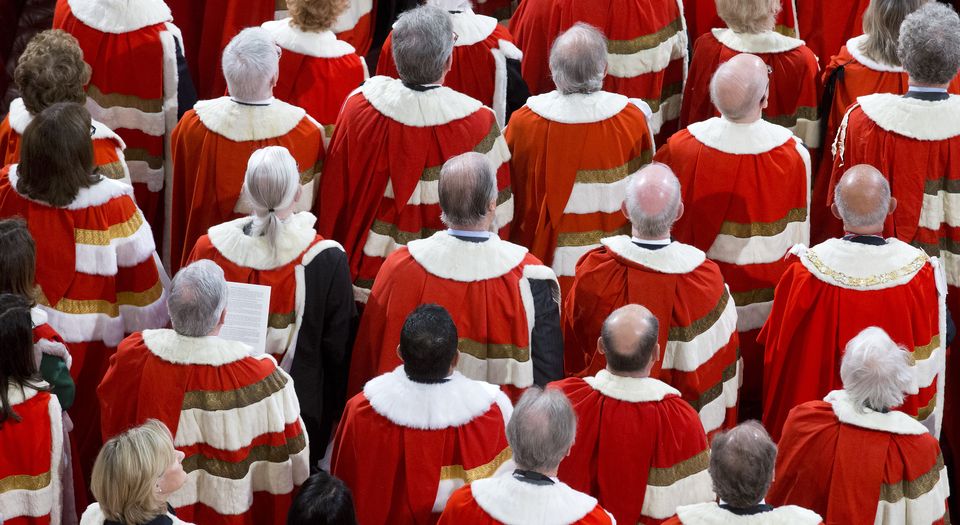The House of Lords defending democracy? Oh please…
We must oppose the draconian Policing Bill. But relying on unelected peers is not the way to do it.

Want to read spiked ad-free? Become a spiked supporter.
There is a stark, authoritarian streak to a number of bills the UK government is currently trying to push through parliament. One such bill is the Police, Crime, Sentencing and Courts Bill, which is currently ‘ping-ponging’ between the House of Commons and the House of Lords. It includes strict limits on the right to protest.
The Policing Bill is extremely draconian. Its vague language will hand vast powers to the police to crack down on free expression. Protests could be restricted, prevented or broken up if the police consider there to be a possibility that they might cause ‘unease’, ‘alarm’ or ‘distress’ to passers-by or people in the area. Even one-person protests and silent protests do not escape its remit.
So, the Policing Bill clearly has very worrying implications for free expression and democracy. Yet there is something even more worrying and anti-democratic about some of the pushback against it. And that is because its chief opponents can be found in the House of Lords.
Earlier this week, the protest elements in the Policing Bill were defeated in the House of Lords, for the second time. So while the crackdown on protest has overwhelming support in the elected House of Commons, unelected peers keep on refusing to pass it.
This is a serious problem. And no matter how much we may dislike this bill, it is especially a problem for those of us who believe in freedom and democracy. Because the House of Lords’ attempts to put ‘checks and balances’ on parliament’s elected chamber, handing authority to unelected appointees and aristocrats in the process, is by far the greatest threat to democracy in the UK.
The very existence of the House of Lords is an authoritarian imposition on democracy. The second chamber has no other purpose than to stifle, limit and curtail the will of our elected representatives and, by extension, the will of the British people.
These unelected peers are not accountable to the people on whose behalf they make and meddle with laws – and that makes them dangerous. As the late great Tony Benn argued, it is better to have a bad parliament than a good king. If we give the thumbs up to the Lords’ meddling on this bill we surrender our right to complain when it does something that we dislike.
We also shouldn’t kid ourselves into thinking that the House of Lords has suddenly discovered some political principles and is now converted to the cause of defending democracy and free expression.
Firstly, the opposition to the Policing Bill reflects the political makeup of the Lords right now, in which opposition peers outnumber the Conservatives. Secondly, while the Lords and the liberal establishment more broadly are uneasy about this bill – at least in part because it was brought in to deal with feted green groups like Extinction Rebellion – they are hardly principled defenders of freedom.
Just look at how the establishment feels about another authoritarian bill currently passing through parliament – the Online Safety Bill, which was presented to the Commons last week. We don’t know how the Lords will respond yet. But while both the Policing Bill and the Online Safety Bill pose a serious threat to freedom and democracy, the Great and the Good are only really exercised about the former. The Labour Party, for instance, opposes the Policing Bill for its ‘attack on our fundamental freedoms’, but the plans for greater censorship of the internet apparently don’t go far enough. The Guardian calls the Policing Bill ‘draconian’, but says the case for limiting speech on social media is ‘overwhelming’.
In other words, a bill stopping the oiks from speaking forthrightly online is something to welcome, but a law that could stop young Jemimah from expressing her feelings about the environment is unacceptable. It is not the principle of free expression that is being defended in the elites’ opposition to the Policing Bill – it is a defence of speech they agree with, from people like themselves.
As for the Lords, the upper chamber simply cannot mount a defence of democratic principles. Any ‘good’ the Lords might do in pushing back on the Policing Bill or other bad laws would be cancelled out and then some by the inherently anti-democratic nature of overriding the will of the Commons.
The Tories’ growing taste for authoritarianism is a big problem, but this is not the way to fight it.
Fraser Myers is deputy editor at spiked and host of the spiked podcast. Follow him on Twitter: @FraserMyers.
Picture by: Getty Images.
Who funds spiked? You do
We are funded by you. And in this era of cancel culture and advertiser boycotts, we rely on your donations more than ever. Seventy per cent of our revenue comes from our readers’ donations – the vast majority giving just £5 per month. If you make a regular donation – of £5 a month or £50 a year – you can become a and enjoy:
–Ad-free reading
–Exclusive events
–Access to our comments section
It’s the best way to keep spiked going – and growing. Thank you!










Comments
Want to join the conversation?
Only spiked supporters and patrons, who donate regularly to us, can comment on our articles.